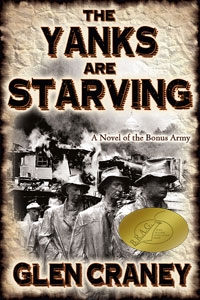by
Glen Craney
American soldiers denied their service bonuses. Protesters stage sit-ins to expose the greed of big banks. Homeless veterans huddle in tents. Rising anger against politicians sparks a populist movement.
Headlines ripped from this year’s front pages—and from newspapers published eighty-five years ago.
History doesn’t repeat itself, Mark Twain warned, but it often rhymes. And during the Great Depression, similar stories of woe and outrage held the nation’s alarmed attention. Long before Occupy Wall Street, there was Occupy Washington.
 In my historical novel, The Yanks Are Starving, I tell the story of eight Americans who survived the fighting in France during World War I and came together fourteen years later to determine the fate of a nation on the brink of upheaval. Culminating with what became known as the Bonus March of unemployed war veterans, the novel is a sweeping epic of the government betrayal that sparked the only violent clash between two American armies under the same flag.
In my historical novel, The Yanks Are Starving, I tell the story of eight Americans who survived the fighting in France during World War I and came together fourteen years later to determine the fate of a nation on the brink of upheaval. Culminating with what became known as the Bonus March of unemployed war veterans, the novel is a sweeping epic of the government betrayal that sparked the only violent clash between two American armies under the same flag.
I became interested in the history of the Bonus March while covering Congress as a Washington, D.C. reporter. After moving to Los Angeles to write movie scripts, I turned my research into one of those screenplays that Hollywood executives say would make a great movie, if only the timing were right. Legendary screenwriter Harry Essex, a mentor and friend, begged me to “shake out” the script into a novel, so I did. As a boy growing up in Brooklyn, Harry remembered the Bonus Marchers, and he told his UCLA writing class that my screenplay was the best he had read in years. I dedicated the novel to him.
Had the Bonus Army tragedy not happened, most would dismiss information about it as too improbable for fiction. Yet in 1932, a charismatic but troubled Oregon hobo decided he’d had enough of eating slumgullion stew and begging for work. Ignoring scoffs that he was a crackpot dreamer, Walter W. Waters jumped onto a boxcar in Portland and led two hundred of his fellow homeless war veterans on a rolling invasion bound for Washington. He was determined to tell President Herbert Hoover of his plight in person.
Reports of this pied-piper quest quickly spread across the country, and within weeks 40,000 veterans and their families, all hungry and desperate, surrounded the U.S. Capitol. This threadbare band of veterans camped in the city for three months and vowed to stay until Congress voted to pay their service annuities early.
Their hopes for government salvation, however, were soon dashed.
On July 28 of that tense summer, Army Chief-of-Staff Douglas MacArthur donned his uniform and took to the field for the first time since 1918. Convinced that the protesting veterans were a mob of slackers and Communists, the general ordered his tanks, cavalry, and regular infantry to drive the veterans from the city and burn their pitiful shacks. Within minutes, Pennsylvania Avenue was a scene of mayhem with flying tear-gas canisters, coughing onlookers, and flashing bayonets. After the despairing veterans scattered back across the country, shocked Americans blamed Hoover for the debacle and voted him out of office during the presidential election that November.
Today, too many of us have a short memory regarding our country’s treatment of returning veterans. I hope the novel serves as a cautionary tale for those who may think that homelessness, joblessness, and psychological adjustment to civilian life are unique challenges for our Iraq and Afghanistan veterans. According to the National Alliance to End Homelessness, nearly 50,000 veterans were homeless in 2014, almost one of every nine. There is, thankfully, more assistance for returning servicemen and women now than in 1932, but effort to eradicate this scourge continues.
Awards won by The Yanks Are Starving:
Foreword Reviews Book-of-the-Year Finalist
Chaucer Award Book-of-the-Year Finalist
Editorial praise:
“[A] wonderful source of historical fact wrapped in a compelling novel.… Each of the characters is written in a depth that makes them come alive. … If you want to learn about one of America’s darkest days, one that rarely gets any attention, this is a book that will both teach and entertain.” — Historical Novel Society
“[A] vivid picture of not only men being deprived of their veterans’ rights, but of their human rights as well. … The Veterans Bonus March was a momentous event in American history and Craney performs a valuable service by chronicling it in this admirable book.” — Military Writers Society of America
“Masterful and courageous…[E]ssential reading for those who found truth and beauty co-existent in the works of John Steinbeck and John Dos Passos.” — Linda Root, The Review Group UK
“Craney has written an outstanding social and military historical novel of the United States covering the crossing over from the nineteenth century mentality into the twentieth century. Simply put, an outstanding novel.” — Joseph Spuckler, Author Alliance reviewer and U.S. Marine veteran.
Author bio: Glen Craney holds graduate degrees from Indiana University School of Law and Columbia University Graduate School of Journalism. He practiced trial law before joining the Washington, D.C. press corps to cover national politics and the Iran-contra trial for Congressional Quarterly magazine. The Academy of Motion Pictures, Arts and Sciences awarded him the Nicholl Fellowship prize for best new screenwriting, and he is a three-time finalist for Foreword Reviews Book-of-the-Year Award. His debut historical novel, The Fire and the Light, was honored as Best New Fiction by the National Indie Excellence Awards. His books have taken readers to Occitania during the Albigensian Crusade, to the Scotland of Robert Bruce, to Portugal during the Age of Discovery, to the trenches of France during World War I, and to the American Hoovervilles of the Great Depression.
Social Media sites:

A truly incredible and timely story. We do shamefully have a very short memory
I think this is a “must read” for all Americans and will be on my Christmas gift list!
Thanks, Geri and Stephanie, for hosting me!
The dark and ugly side of America is usually avoided, but Glen Craney brought it front and center. Kudos to him. People need to hear the good, the bad, and the ugly about the country we live in. History is written so we never forget and, hopefully, never repeat. Truth has a way of coming to light.
Agreed, Sharon!